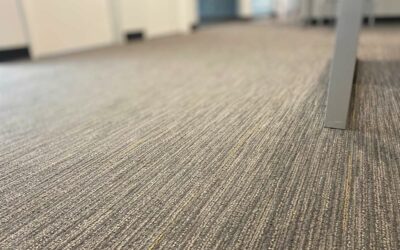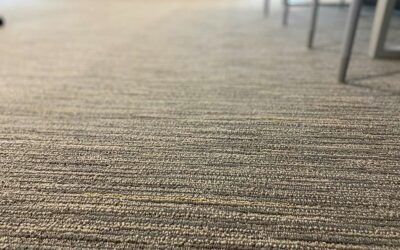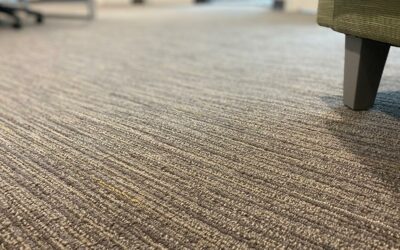Types of Commercial Flooring
Commercial Flooring Types
Commercial flooring comes in many different types – what distinguishes it from other flooring varieties is its big-time heavy-duty qualities. And don’t think that just because it’s a heavy-duty flooring solution, its aesthetic comes as a downfall!
As a matter of fact, commercial flooring is known for being tough, durable, and all the while attractive which makes it a great choice for many different spaces – lobbies, waiting rooms, office areas, patient rooms, etc.
Because of all of these situational variables, there is a variety of commercial flooring options to meet an array of business needs. Varieties of commercial flooring include commercial carpet, commercial luxury vinyl, commercial tile, rubber, and Marmoleum.
Keep reading to gain insight into how each of these commercial flooring types is unique! Maybe you’ll find one just right for space!
Commercial Carpet
When you think of carpet, you probably think of spaces like your bedroom or cozy family room. And you might be surprised to know that this type of carpet is not a one-space-fits-all solution.
Carpet found in homes is called residential carpeting. It’s often designed with comfort at the forefront of the mind.
Characteristics of Commercial Carpet
Commercial carpet, on the other hand, is a different grade of carpeting that is made to withstand more wear and tear, pressure, and foot traffic – durability takes priority! It’s a low-pile carpet with a tighter looping style which makes it more stain resistant as well.
An important characteristic of commercial carpeting is that it is easier to maintain and clean than residential carpeting – just think of how much more can get spilled or stained in an area of business, as compared to a home.
Commercial carpet generally comes in two different types: broadloom and carpet tile/plank. Broadloom comes in a roll like most residential carpeting you might see, while tile/plank commercial carpeting offers a different installation system.
Advantages
– Adds warmth to a space – physically and aesthetically
– Reduces the amount of sound in a space
– The soft underfoot feel can be more comfortable than some other commercial flooring types.
– Relatively easy to clean
Disadvantages
– Can be easily stained when compared to other types of commercial flooring
– Allergens can get stuck in the carpet fibers.
– If replacement is needed, it’s likely that the entirety of the carpet will need to be ripped out and replaced (this does not apply to carpet tiles/planks).
Ideal Applications
Commerical-grade carpeting is a more traditional choice when it comes to commercial flooring options. It’s often found in office spaces where adding warmth is desired. Spaces concerned with sound and privacy should consider the use of commercial carpets due to their sound-absorbing qualities.
Schools and medical facilities often use commercial carpets as one of their chosen flooring solutions when noise can pose a disruption. It’s common to see commercial carpets in common spaces of commercial areas like break rooms and shared office spaces.
However, in commercial spaces with heavier foot traffic, commercial carpeting is not the best solution given it’s not as durable as other commercial flooring options out there.
Get in touch with our team to discover your floor covering and installation options. We’re looking forward to working with you.
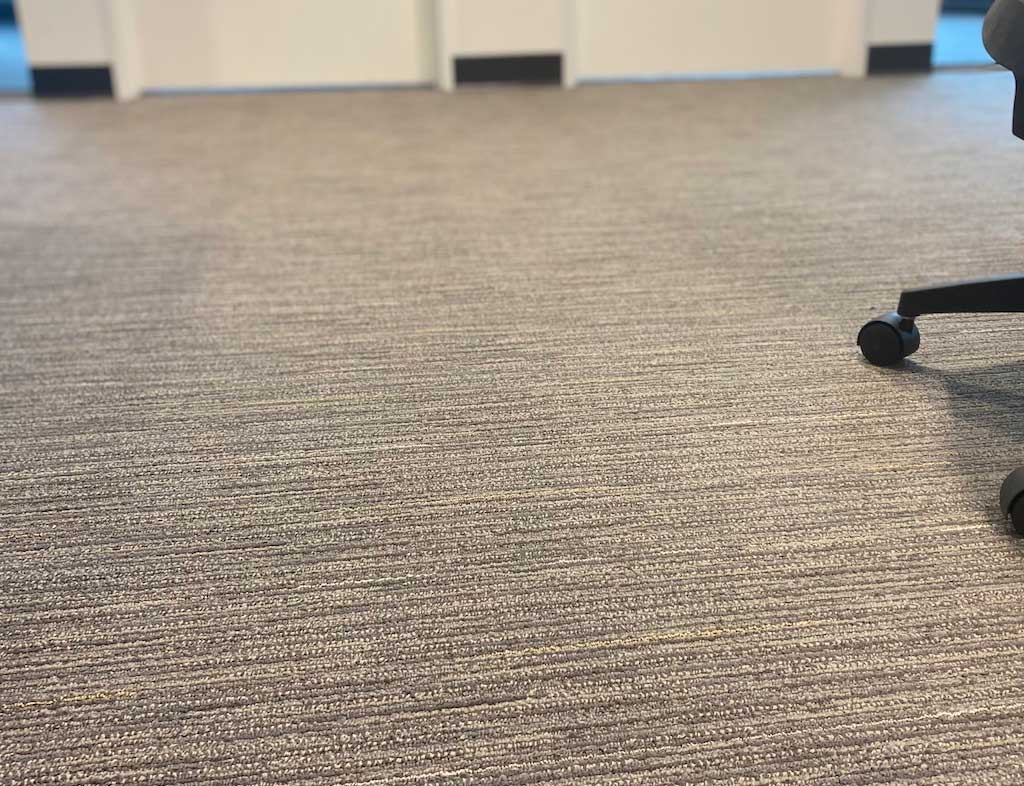
Commercial Luxury Vinyl
Luxury vinyl plank (LVP) and luxury vinyl tile (LVT) are two kinds of luxury vinyl flooring. The planks are meant to mimic real hardwood floors while the tiles give off a different look – both are quite the upgrade from traditional vinyl flooring. The construction method consists of different layers, each with a different purpose.
As a whole, luxury vinyl flooring comes in different grades. Commerical-grade luxury vinyl flooring has a higher density and is more durable than its residential counterpart. It comes with natural wood, stone, or tile-mimicking looks but without the price tag and difficult installation!
Characteristics of Commerical Luxury Vinyl
Commercial luxury vinyl flooring is a great product to use when you really want to nail a certain aesthetic in a commercial space. It comes in a variety of stylistic options with tons of shapes, patterns, colors, and designs to pick from.
New technology has delivered top-notch printing capabilities for the imaging found on luxury vinyl planks and tiles which are made to mimic a real hardwood, tile, or stone floor. Some styles even come with imaging that mimics seams for grout. Others can be made to replicate the feel of real hardwood floor knotting.
Even with its stylistic flair, luxury vinyl can be depended on to be the durable flooring solution needed in commercial spaces, while also being quite simple to maintain.
Advantages of Luxury Vinyl
– High-end feel for the small price tag
– Realistic look with increased durability and easy maintenance
– No waxing, re-finishing, or polishing is needed – flooring doesn’t get much more low maintenance than luxury vinyl flooring!
Disadvantages of Luxury Vinyl
– Underfoot feel might not be ideal for employees who have to stand all day
– Installation is best left to the pros.
Ideal Applications
Due to its water-resistant potential, luxury vinyl flooring is an excellent option for restaurants or cafes that might have lots of chances of spills. Luxury vinyl flooring is a very durable flooring choice and some brands offer warranties of up to 20 years. Commercial areas with high foot traffic are ideal environments for luxury vinyl flooring due to their longevity and durability!
Commercial spaces that hold looks as a top priority should consider using luxury vinyl because it’s a great product that delivers high-end energy! Also, commercial spaces that might be going for more of a residential feel might want to use luxury vinyl as stylistic options are inclusive of a more intimate (less sterile) feel.
You’ll often see apartment complexes outfitted with luxury vinyl products. Hotels, kitchens, and bathrooms commonly use commercial luxury vinyl flooring due to its great looks and water-resistant qualities. It’s also a popular product to use in common areas of hospitals, restaurants, and childcare centers due to its combination of sound-absorbing qualities, moisture resistance, and ability to withstand heavy foot traffic.
Luxury vinyl is easier to clean than carpets, cheaper than hardwood floors, and still comes with the durability you need in a commercial space. It’s quite the product!
Get in touch with our team to discover your floor covering and installation options. We’re looking forward to working with you.
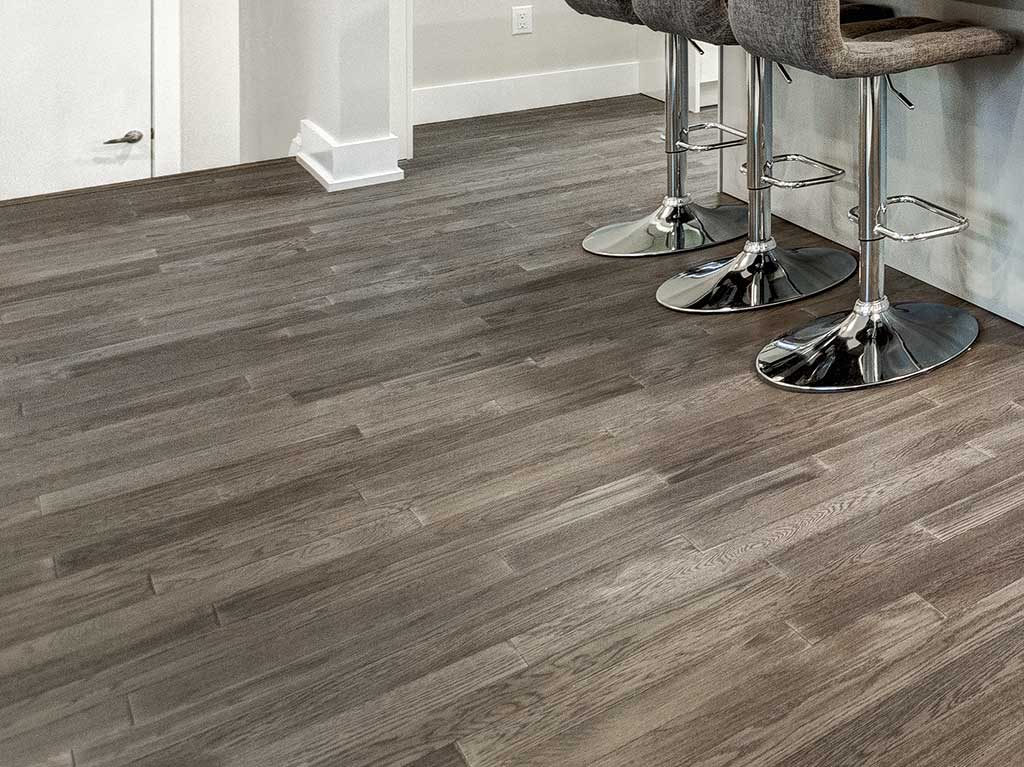
Commercial Tile
Commercial flooring types also include a category of vinyl composite flooring products – they contain a mix of vinyl and other materials. These types of flooring are different than luxury vinyl tile which contain 100% vinyl.
Specific types of such flooring products include vinyl composite tile (VCT), vinyl enhanced tile (VET), and static dissipative tile (SDT) – all with different characteristics.
Characteristics of Commerical Tile
Commercial tile is an extremely durable flooring material. It’s likely to be the flooring material found in your local grocery store or certain areas of a hospital. If you can remember being in school and having computer lab days, you can bet that the flooring in your computer lab was a special type of commercial tile!
VCT and VET are sometimes thrown in the same category. Both are slighter versions of luxury vinyl flooring and are more porous – they do come at a lower price point. SDT is known for its static absorbing qualities and is a cornerstone flooring material in commercial spaces where electrical resistance is paramount.
Advantages
– As a whole, commercial tile is a cost-conscious choice.
– Scratch-resistant
– Sound-dampening surface
– SDT is a viable option to control the static in a lot of different work environments.
Disadvantages
– If not installed correctly, the tiles can lift at the corners.
– A completely level subfloor is required for installation.
– Occasional polishing and buffing are needed to keep up the looks and glossy appearance.
– Less water-proof than luxury vinyl products.
Ideal Applications
When considering the use of commercial tile for your flooring solution, be sure to check its technical performance by referring to the manufacturer slip resistance information. Also, be mindful of your chosen tile product’s hardness rating to ensure it meets the flooring needs of your commercial space.
Commercial tile flooring is often used in schools and hospitals because it’s durable and can fit into a lot of different budgets. You’ll see VCT/VET in commercial areas with especially heavy foot traffic and rolling loads.
SDT can be expected in commercial areas with the presence of equipment susceptible to electrostatic discharge. In specific, SDT is used in radio stations, computer labs, electronics manufacturing facilities, air traffic control towers, and more.
Get in touch with our team to discover your floor covering and installation options. We’re looking forward to working with you.
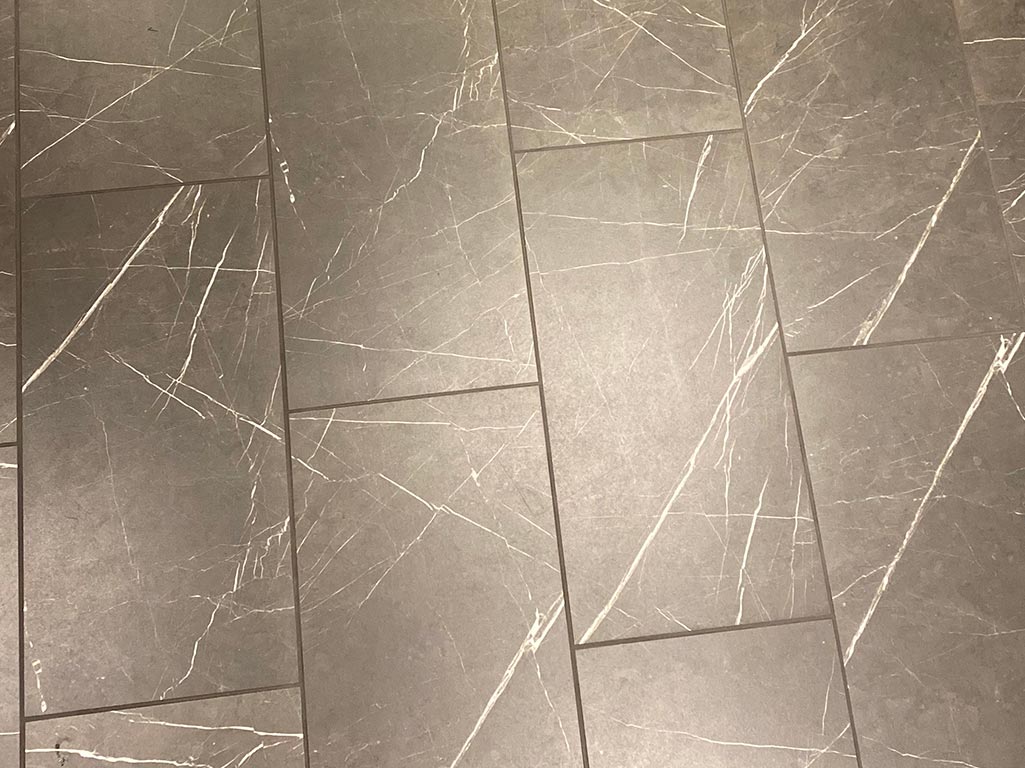
Rubber Flooring
When design and aesthetics take the backseat to functionality and comfort, rubber flooring is a great choice for commercial flooring. If you’ve been to some type of workout facility, it’s likely you’ve walked upon rubber flooring.
Characteristics of Rubber Flooring
Because of its rubber composition, rubber flooring is very resistant to wear and tear unique to rolling heavy loads and the bearing of equipment. Recycled rubber floors are made of materials like tires, sports equipment, and some shoes. The rubber used in rubber flooring can also be extracted from certain trees! Synthetic rubber floors also exist.
Rubber flooring has a cushioned design that makes it more comfortable for employees and customers to walk upon – think medical professionals in a hospital or members of a fitness facility. Shock resistance is a key feature of rubber flooring! Rubber floors also provide a great under-foot grip.
Rubber flooring comes in two types: rubber rolls and tile rubber. Similar to a roll of carpet, rubber rolls offer a more seamless way to install a rubber floor. You have many options when it comes to dimensions and colors!
Per their name, rubber tiles make up a different type of rubber floor that usually come in squares that are installed with either an interlocking system or glue down method. Generally, rubber tiles are better in smaller spaces, as opposed to using rubber rolls.
Advantages
– Extremely durable
– Water and spill resistant
– Easy to maintain
– Indent resistant
Disadvantages
– Slippery when wet – spills must be addressed immediately
– Rubbery smell that does tend to subside over time
– Higher price upfront
Ideal Applications
Rubber flooring is typically noise and shock-absorbent which makes it a preferred option in gyms. These floors can withstand the drop of dumbbells or the incessant thudding on treadmills. Their shock-absorbing qualities also make it a more comfortable flooring option for athletes working out.
In specific, rubber tiles are best suited for weight rooms where a thicker rubber flooring option is needed. Rubber rolls are best for commercial gyms that house larger spaces and have high amounts of traffic.
Rubber flooring is also used in educational settings and healthcare facilities that experience high traffic. Generally speaking, smaller areas are better suited for tiles while larger more expansive spaces do well with rubber rolls with less seaming.
With that being said, tiles are better suited for commercial spaces that wish to have unique patterns or other types of designs because rubber tiles’ color and modular shaping can be manipulated.
Get in touch with our team to discover your floor covering and installation options. We’re looking forward to working with you.
Marmoleum
If you think Marmoleum sounds like linoleum, you’re on the right track! Marmoleum is a brand name for linoleum flooring made by Forbo Flooring Systems.
Unlike linoleum, Marmoleum is made from almost all natural materials. You can think of Maromleum as an updated, eco-friendly version of linoleum flooring.
Characteristics of Marmoleum
Maromleum comes in both rolls/sheets and tile form. You have quite an array of colors to choose from as well as different collections that will help you find your right fit!
Unlike many other commercial flooring types, Marmoleum does not have that typical cold feel to it when walked upon.
For a highly durable commercial flooring product, it’s very easy to clean, static-free, and heat-resistant.
Marmoleum is considered an environmentally safe flooring option because, unlike its linoleum counterpart, it is made from natural raw materials – it’s also recyclable.
Advantages of Marmoleum
– No unfavorable odor (unlike some rubber flooring products) and no harmful VOCs
– Anti-microbial – dust mites and other allergens are reduced
– Available in many different colors and patterns
– Inexpensive to repair
Disadvantages of Marmoleum
– Needs to be installed by professionals and it requires a perfectly flat subfloor
– It needs to be sealed and finished well. This seal must be maintained throughout its lifetime.
– Dent and stain prone
– Ideal Applications
– Any areas exposed to acids or chemicals from certain cleaners should not be considered for Marmoluem installation.
Many educational settings and hospitals use Marmoleum floors due to their anti-microbial quality. Being that they are a commercial product, Marmoleum can withstand heavy amounts of floor traffic.
Marmoleum is easy and relatively inexpensive to repair – spaces susceptible to probable damage might consider their use.
On a different note, Marmoleum is now being used on surfaces besides floors – countertops, desks, walls, and more.
Conclusion – Commercial Flooring Types
When it comes to commercial flooring types, your options are endless. There are many different varieties each with their own combination of qualities – you are sure to find the perfect type to meet your needs.
Commercial flooring doesn’t have to be “all work and no play!” You are free to choose from different design styles to achieve your desired look while also upholding the durability needs of your commercial flooring space.
At Lakeside Floor Coverings, we want you to find the right flooring for your space! Take some time to assess your needs so you can be sure that you get the best product for your space!
Get in touch to get started on your flooring project. Our friendly staff can arrange a time for you to visit our showroom or for our professional team to visit your home or commercial property for an on-site estimate. Call 763-503-0100.
Commercial Flooring Types FAQs
How to choose commercial flooring?
When considering commercial flooring options, there are four main criteria to consider before proceeding into the nitty-gritty details: durability, style, ease of maintenance, and cost. Notably, some commercial flooring options work better in some spaces than others.
What are commercial floors?
Commercial grade floors are designed for the unique scenarios that commercial spaces face. Business owners choosing new flooring for their retail, commercial or industrial spaces need to make a smart investment — one that will continue to serve them for years to come.
Why is commercial flooring important?
It not only improves safety and reduces liability but also benefits productivity by minimizing downtime due to accidents or injuries. Having the right industrial flooring is one of the best investments any company can make to provide a safe and productive environment for employees and customers.
RELATED POSTS
How to Make High Traffic Carpet Look New
How to Make High Traffic Carpet Look NewThere’s some good news that comes along with tips on how to keep your...
Tips and Tricks for Carpet Cleaning in High-Traffic Areas
Carpet Cleaning High Traffic AreasWhen it comes to cleaning practices for traffic-friendly carpets, you must...
What Carpet is Best for High Traffic Areas?
Best Carpet for High Traffic AreasToday’s carpeting products greatly overshadow the carpeting of the past!...

